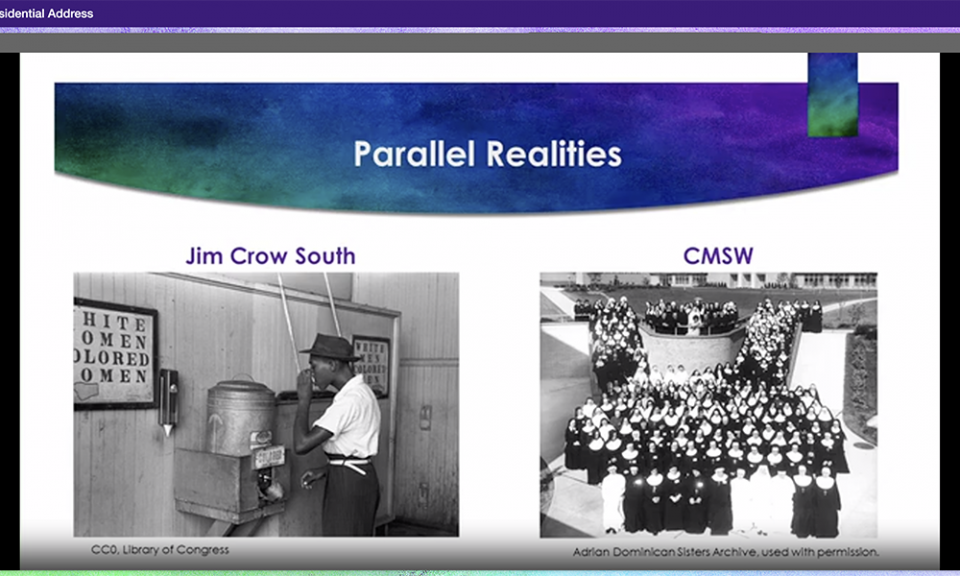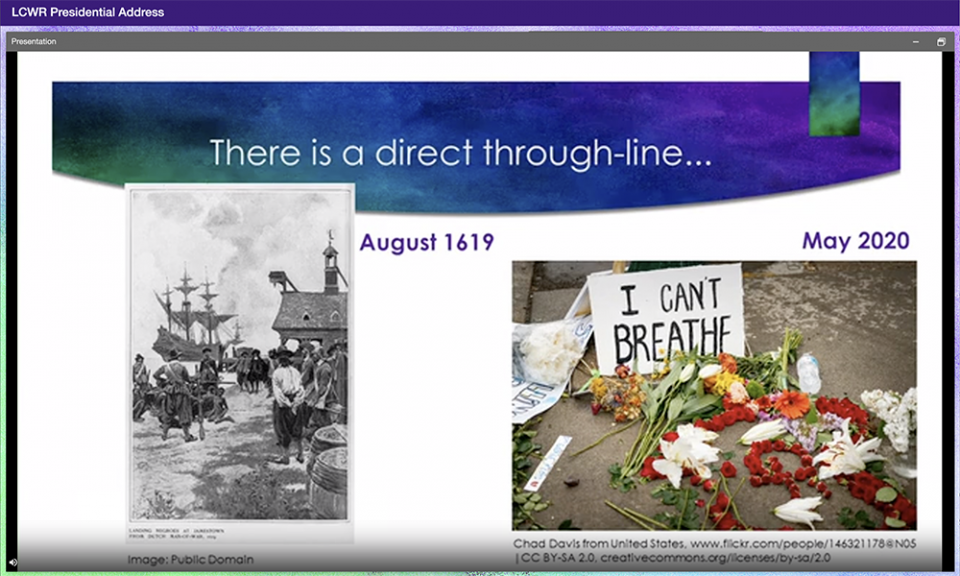LCWR 2021 Elise Garcia and Jane Herb.png
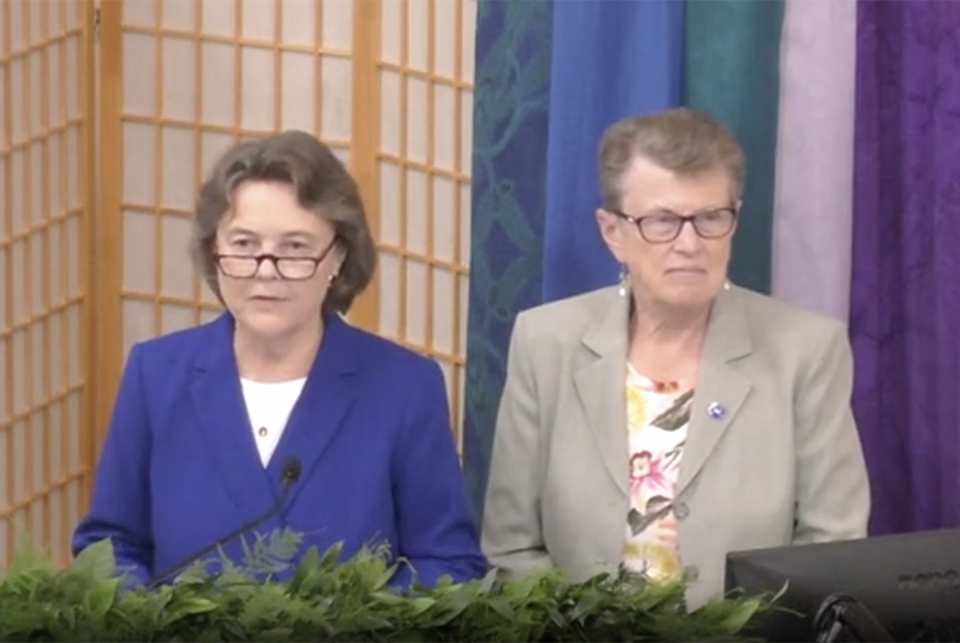
The president of the Leadership Conference of Women Religious began the group's annual assembly with a sweeping indictment on the Catholic Church's role in racism, which was followed by the triumvirate presidency and executive director offering "a profound apology" for women religious' role in it and praying for forgiveness.
The first day of LCWR's annual gathering, which runs from Aug. 11 to 13, began with quiet contemplation, reflection and prayer, especially for those lost over the last year. It ended with President Sr. Elise García chastising the church, its bishops, vowed religious and institutions for participating in the origin and perpetuation of "our nation's perduring sin of racism."
The complicity "begins with the 15th century papal bulls that sanctioned the African slave trade, which led to the chattel slavery of more than 12 million children, women and men, and the appropriation of land that resulted in the genocide of up to 20 million Indigenous people in the Americas," García said. "It persisted through our tacit or explicit engagement in Jim Crow, state-sanctioned segregation, and other injurious government-supported practices. We see its pattern to this day as we take part in our national race reckoning."
After García, an Adrian Dominican, finished her presidential address, she was joined by President-elect Sr. Jane Herb of the Sisters, Servants of the Immaculate Heart of Mary; Past-President Sr. Jayne Helmlinger of the Sisters of St. Joseph of Orange, California; and Executive Director Sr. Carol Zinn of the Sisters of St. Joseph of Philadelphia. All four, on behalf of the conference and its members, acknowledged "these sinful acts by our congregations and institutions" and apologized.
LCWR 2021 all four prayer.png
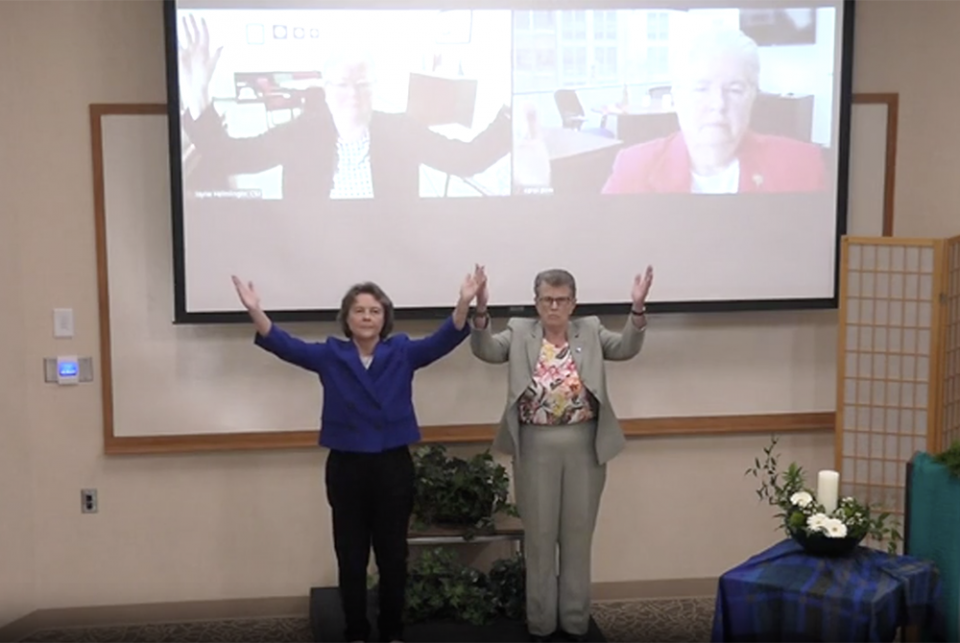
"Together, we stand at the foot of the cross with hearts broken open," Zinn said. In between apologies, attendees heard verses of the Black spiritual, "Were You There?"
LCWR represents about 80% of the more than 40,000 sisters in the United States. As in 2020, the assembly, which has more than 1,100 participants registered, is virtual because of the coronavirus pandemic. García spoke from the auditorium of the Adrian Dominican motherhouse in Adrian, Michigan, and was joined there by Herb, whose motherhouse is about 40 miles away, in Monroe, Michigan. Helmlinger and Zinn participated via video.
LCWR 2021 Jayne Helmlinger and Carol Zinn.png
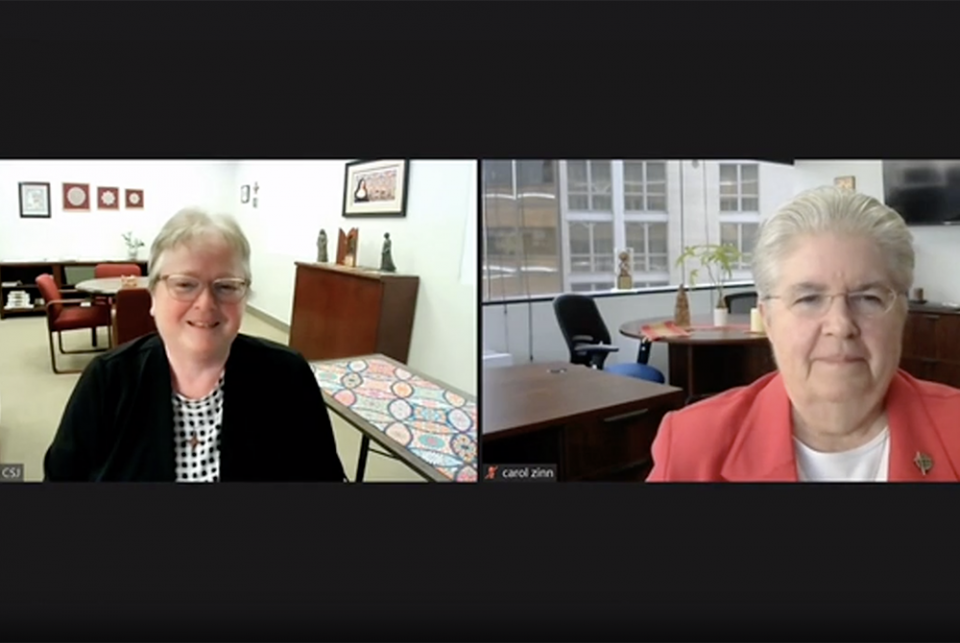
At the 2016 assembly, LCWR members resolved to "examine the root causes of injustice, particularly racism, and our own complicity as congregations," but the commitment did not seem to lead to widespread action. In 2020, just a few months after the murder of George Floyd by a police officer, the group called on members to join efforts to "name and eradicate racism within themselves, their congregations, their ministries, and LCWR as an organization." Since then, many communities have begun to examine their own racist histories, biases and policies.
But the Aug. 11 presidential address was a profound condemnation of the entire church's role in "blindness, willful ignorance, and unexamined white privilege," as Zinn put it; "our tacit or explicit engagement as women religious in Jim Crow, state-sanctioned segregation and other white supremacist practices," as Helmlinger added; and "the enslavement of children, women and men," as Herb acknowledged.
LCWR 2021 Elise Garcia speaks.png
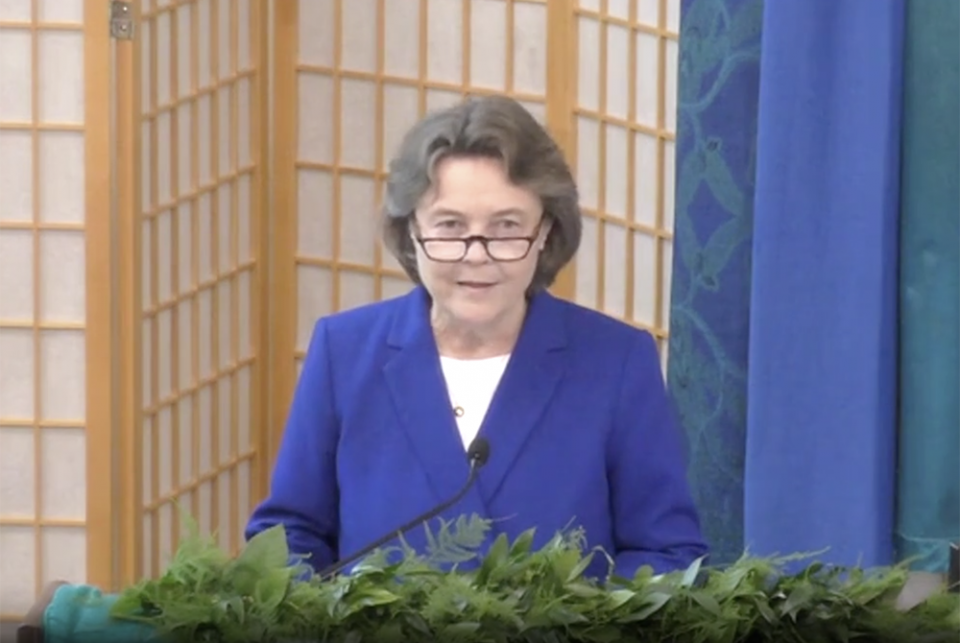
García's 40-minute address began with the story of the formation of the conference in 1956 — then known as the Conference of Major Superiors of Women — then showed how the killing of Floyd and the global coronavirus pandemic exposed how white supremacy has been woven into society and, by extension, religious congregations.
"It is the white supremacy that was very much alive in the Jim Crow 1950s when our conference was formed: The white dominant world reflected in the complexion of our foremothers gathered 65 years ago and the women in their convents back home," García said. It is "the white dominance we still see reflected in our conference and in our communities, the inevitable result of unspoken assumptions about race that exploded open during our COVID confinement."
These examinations may be painful, she said, but they are foundational.
"We recognized that addressing the sinful breach and heresy of racism and white supremacy is at the heart of our identity as women of the Gospel," García said. "This is a sacred task of cosmic dimensions."
It is also critical to American society.
"We as Americans have cheated ourselves of the full truth of our history, ignoring or eliding the painful stories that inextricably interweave and form the full fabric of our lives as African Americans, Native Americans, Asian Americans, Euro Americans, Latinx Americans," García said. "There is a direct through line of oppression and white supremacy in our history, from the first enslaved Africans disembarking the White Lion, an English privateer ship, in Hampton, Virginia, in late August of 1619 to the murder of George Floyd on a street corner in Minneapolis, Minnesota, in late May of 2020. We need to know this."
She described American society as a caste system, citing the book Caste: The Origins of Our Discontents by Isabel Wilkerson at several points.
"We haven't thought of racism in the United States in terms of caste. When most of us think about caste, we think of a system that is arbitrary, unfair, unjust, and foreign to our experience," García said. "Regardless of their education, career achievements, material wealth or other markers of status, our Black sisters and brothers to this day live under the oppression of a menacing caste system that daily abases."
García said white supremacy "is not just a right-wing fringe phenomenon, but a powerful and insidious construct that is in the air we breathe and water we drink — and has been, under different guises, for centuries."
Women religious have a role to play in identifying racism, white supremacy and caste, she said. "Consciously acting to dismantle them in our personal lives, institutes, conference and ministries is a powerful way we women religious can and must exert our moral authority."
LCWR 2021 Elise Garcia ovation.png
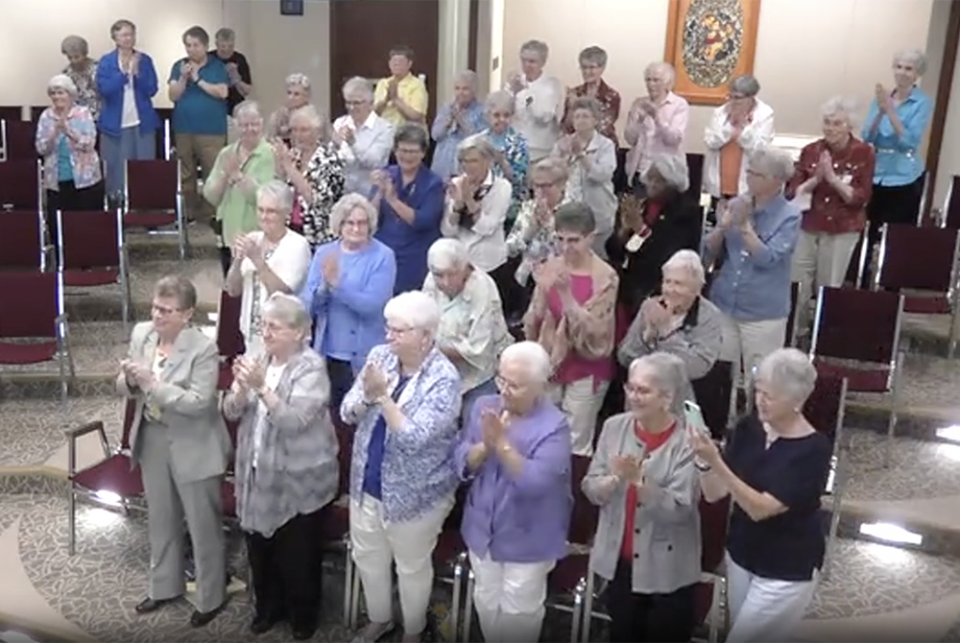
True reconciliation, García said, will come with a cost.
"As we look to the emerging future of our religious life, what could be more vital to its future than to give vibrant public witness to the power of God's transformative love by doing the profound truth-telling, repentance and, yes, the reconciling reparations work needed?" she asked. "There is a growing movement for reparations that we women religious could add our appreciable weight to in support."
García said the work cannot be limited only to racial reconciliation.
"Although we have focused today on the image of God reflected in and through our Black sisters and brothers, surely we are called to no less a reckoning and loving encuentro with our Native, Asian and Latinx kin; with other sisters and brothers harmed by cultural or religious bias and exclusion; and with our lesbian, gay, bisexual, transgender, queer and nonbinary brothers and sisters," she said. "Each of these, our kin, reflects the glorious and inexhaustible image of God."
LCWR 2021 Elise Garcia discussion.png
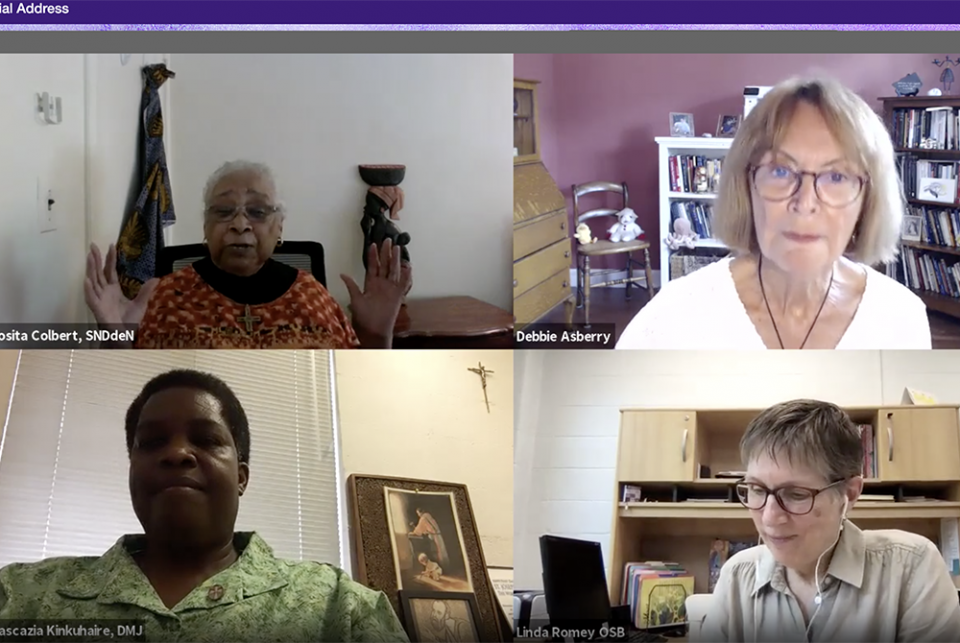
In a post-address conversation between Sr. Josita Colbert, a Sister of Notre Dame de Namur and the president of the National Black Sisters' Conference; Sr. Pascazia Kinkuhaire of the Daughters of Mary and Joseph; and Sr. Linda Romey, a Benedictine Sister of Erie, Pennsylvania, Colbert said she was particularly glad García quoted Fr. Bryan Massingale, who wrote that the Jan. 6 assault on the U.S. Capitol was "a clear declaration that many white people would rather live in a white dictatorship than in a multiracial democracy."
"I feel that more and more each day when I see and hear things, particularly in our church and in our congregations, as well," Colbert said. "It's almost like a step backward rather than forward. It used to be subtle; now, it's out there."
Romey noted that feminism has often meant white feminism, and racism and sexism must be taken out together.
Advertisement
Advertisement
"I believe we hold the power to unleash a force that can truly change the world's story," Romey said. "The question is, will we? Not only does the future of religious life depend on it, but I believe the future of the world depends on it."
Kinkuhaire, who is from Uganda but serves and lives in California, said the examination of racism must cross all racial and cultural lines.
"We need to accept in one way or another, we are all racists. As women religious, we are all directly or indirectly participating in exclusion rather than inclusion," Kinkuhaire said. "We need to accept the past and learn from it. We need to understand our own privilege."
Like what you're reading? Sign up for GSR e-newsletters!


